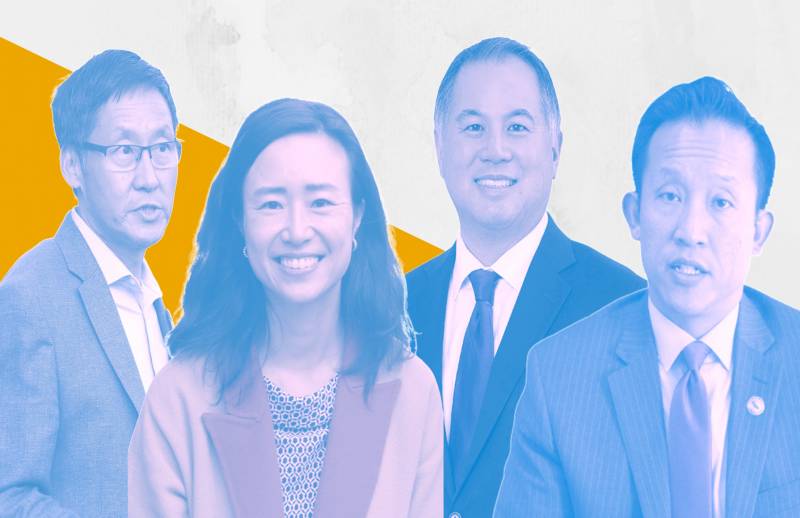Todd David, who’s running a well-funded committee called “Concerned Parents Supporting the Recall of Collins, Lopez, and Moliga,” criticized elected officials who try to have it both ways — calling on Collins to resign, while declining to endorse the recall.
“Supervisor Mar and Supervisor Chan have different rules for themselves than they do for people who, you know, volunteer their time at farmers markets to go collect signatures,” David said. “I just find that argument bizarre.”
For her part, Collins, in an interview with KQED’s Vanessa Rancaño in November, insisted she is a victim of hate, not a perpetrator. She sees it as part of a larger right-wing plot. “All of a sudden it’s on Fox News. And this is all very, very organized activity that’s been happening on a national level and it’s highly funded,” she said.
San Francisco Board of Education President Gabriela López also dismissed some of the criticisms she and her colleagues are facing in the recall campaign, including that they acted too slowly in reopening the schools.
“But this sense of just returning to return because of the pressure that people were giving us, or the fact that the city sued the school district — which I still disagree with — and trying to push these efforts to appease a voter base that honestly wasn’t impacted by the pandemic in as many ways as other communities were who didn’t want to return, is all political,” López told KQED in October.
“The fact that people keep pointing to the renaming issue is another, for me, excuse to kind of point to that fact. And I say that because the renaming work had begun before members were even on the board. It was passed by a previous school board a couple of years back, and work had begun on a topic that hadn’t been finalized yet.”
Having raised just $12,631 last year, the campaign opposing the recall said they’re hoping to reach voters through person-to-person contact within existing networks of parents and teachers.
“We’re not able to depend on TV ads and mailers,” said Tara Ramos, a co-chair of the No campaign. “So we’re just doing a lot of footwork, getting out there, talking to our own community at our school sites and our neighborhoods.”
Moliga has opted to run a separate campaign, raising $35,500 and relying largely on appearances at local Democratic clubs and community forums to spread his message.
“The relationships are already there,” said Moliga. “I’ve done plenty of work being on the school board with the Chinese community.”
Moliga touted a recent visit he took to Chinatown to meet with members of the Chinese Progressive Association and students who helped create the “Our Healing in Our Hands” initiative. The policy was passed by the school board in 2019 to improve wellness services, particularly for Asian American students.
Voter outreach ahead of the recall vote, Moliga said, will rely on these existing networks of support.
“I could probably go out there and pull 5,000 votes, 5,000 people who know me just because I’m from this city,” Moliga added. “I can go to Chinatown, I can go to the Richmond district.”
City at a turning point
David Lee, executive director of the Chinese American Voter Education Committee, sees dissatisfaction with the school board as just one of the numerous urgent issues facing the community. Standing in Portsmouth Square — “the living room of Chinatown,” Lee said — he pointed to the rise of anti-Asian hate crimes and the pandemic-flattened economy, noting the absence of people in the square just a few days from Chinese New Year celebrations.
“To see Chinatown boarded up, we’re lacking in the kind of vibrancy that you would normally see at this time of year,” Lee said. “It is a true indication of the frustrations of the Asian American community.”
For the first time ever, Lee’s organization produced a “get out the vote” video in Mandarin and Cantonese, with Ting, Chan and Chiu. “Because we feel that the city is at a turning point, the Asian American community, particularly the Chinese American community, feels that the city is headed in the wrong direction,” he said, adding that many see the Feb. 15 election as a chance to change course.
Data shows that supporters of the school board recall are highly concentrated on the city’s west side, where most of the precincts have majority Asian, including Chinese, households.
The grassroots Chinese/API Voter Outreach Taskforce, which formed after the recall qualified for the ballot, said it has registered 430 new Asian American voters just since mid-December, including 330 first-time voters and 100 noncitizen parents who are eligible to vote in local school board elections.
While the well-organized recall supporters are confident of victory, the future is still filled with uncertainty for many parents.
Allene Jue, a San Francisco mom with two toddlers, is now struggling to choose between public and private kindergarten. “My kids are not even in public school, but it’s important for me to stay involved,” Jue said, adding that she’s been paying extra attention to local politics, and the recall movement really “resonated” with her.
“I did graduate from Lowell,” said Jue, who considers herself a proud public school product. But now she feels being Asian is “not welcomed” in the school district.
KQED’s Guy Marzorati contributed to this story.
This article has been updated to identify restrictions placed on the city attorney by the City Charter.
Note: This story is part of a collaboration between KQED and Han Li of The San Francisco Standard to cover the school board recall election. Han Li can be reached at han@sfstandard.com or on Twitter @lihanlihan.

